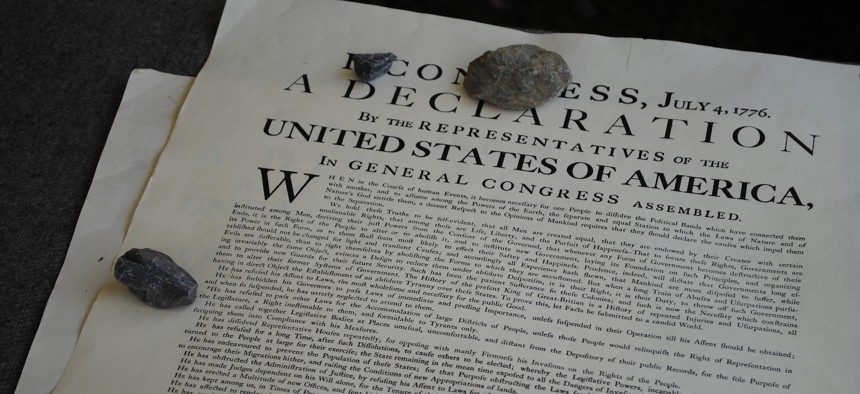
Flickr user Aaron Smith
Happy Belated Independence from Government Day
A curious reinterpretation of the Declaration of Independence from a would-be GOP presidential contender.
We hold these truths to be self-evident, that all men are created equal, that they are endowed by their Creator with certain unalienable Rights, that among these are Life, Liberty and the pursuit of Happiness.--That to secure these rights, Governments are instituted among Men, deriving their just powers from the consent of the governed,...
How did you spend your Fourth of July? For many people, the day brought cookouts, parades and fireworks displays. But Wisconsin Gov. Scott Walker, a not-officially-declared but already popular candidate for the Republican presidential nomination, devoted at least part of his holiday to a different endeavor: reinterpreting the Declaration of Independence.
Here’s Walker, on Twitter:
In America we celebrate July 4th not April 15 because in America we celebrate our independence from the gov't, not our dependence on it.-SKW
— Scott Walker (@ScottWalker) July 4, 2015Walker elaborated on the theme on the Red State blog:
The founders did not declare their independence from one big government only to create another. That’s why the 4th of July – not April 15 – is a national holiday. Americans don’t cheer our dependence on government, but rather our independence from it.
Freedom and prosperity aren’t created by federal bureaucrats in Washington. These principles are God-given rights that empower us to live our own lives and control our own destinies. This belief is what makes America a beacon of hope around the globe.
That’s a curious take on a document that is expressly aimed at laying out the principles for what constitutes a just and reasonable government. As the quotation above indicates, the Declaration explicitly endorses government as a means of securing life, liberty and the pursuit of happiness. It’s an argument for replacing a tyrannical government with one that reflects the will of the people, not for declaring independence from government.
In case there was any doubt, the Declaration concludes by laying out some specific examples of the types of governmental authority the colonies claimed for themselves: “full Power to levy War, conclude Peace, contract Alliances, establish Commerce, and to do all other Acts and Things which Independent States may of right do.”
That’s a prescription for a rather expansive (“all other Acts and Things”) government.
Walker’s interpretation of the Declaration continues a recent trend on the right of viewing government as the “other”: A mysterious, unaccountable force that, despite the electoral process, somehow exists independently of the will of the people.
Walker writes that the principle that true freedom comes from God, not government, “is under assault by the actions of a federal bureaucracy that is always expanding and encroaching more upon our daily lives. The political class in Washington, along with President Obama, Hillary Clinton, and their special-interest allies, embrace this bureaucratic mess and are fighting to make government the arbiter of individual success.”
This presupposes that government and bureaucracy are somehow expanding of their own volition. In fact, government has grown as Americans, throughout the course of the country’s history, have decided that they want it to undertake everything from highway construction to space exploration on their behalf. Government, for better or worse, is us, and it accurately reflects the messy, complicated relationship Americans have with central authority.
This tension between building the United States of Leave Me the Hell Alone and the United States of Let’s Get Things Done is something to be celebrated, not feared--and not just on Independence Day.
Photo by Flickr user Aaron Smith







